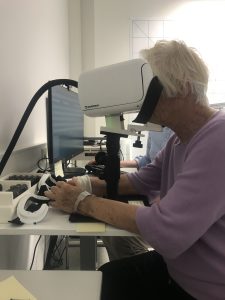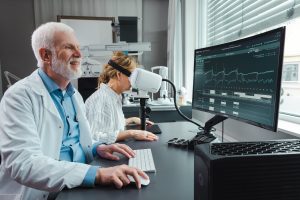Bulbitech and Meddoc Medical Research Institute, Norway, in collaboration with the Neurological Department at Oslo University Hospital, will soon release promising results from a clinical validation study focusing on the internal consistency and test-retest validity of BulbiCAM measurements. This study aimed to assess the repeatability and stability of BulbiCAM measurements and explore new functional biomarkers, particularly in Parkinson’s disease patients, who often face challenges with fixation and calibration due to tremors and symptom fluctuations.
Introduction
Bulbitech AS is a MedTech company specializing in developing functional biomarkers derived from eye and pupil data captured by the high-speed eye tracking camera, BulbiCAM®. Research has shown that diseases affecting the central nervous system or the eye often exhibit early signs through eye and pupil metrics, making them potential biomarkers for disease detection.
Functional Biomarkers
Functional biomarkers, unlike structural examinations, assess the activity level of organs and tissues. In medical contexts, they measure organ or tissue function rather than physical structure, providing valuable insights into conditions such as neurodegenerative disorders and eye diseases. Oculomotor abnormalities, detectable through eye and pupil metrics, can serve as early markers of disease and treatment efficacy.
Assessment of Eye and Pupil Metrics
Traditional methods for assessing eye and pupil movements are subjective and lack quantifiable diagnostic data. The BulbiCAM® device captures and quantifies eye movements and pupil data, enabling objective assessment of oculomotor biomarkers associated with various neurological and eye conditions. Statistical analysis reveals significant differences in these metrics between patients and healthy individuals, aiding in diagnosis and monitoring.
Validation and Stability
Validation trials adhered to regulatory requirements and demonstrated good reliability and stability of BulbiCAM® measurements. Neurological studies conducted at Oslo University Hospital found good agreement in various variables, with moderate to excellent intra-class correlation scores. Stability analysis over a two-day period showed moderate to good stability, particularly in measures of saccades and smooth pursuits.
Biomarkers
Investigation into biomarkers in Parkinson’s disease patients identified a set of ten biomarkers, six of which showed significant differences compared to healthy controls. These biomarkers are crucial for early disease detection and monitoring disease progression, complementing conventional diagnostic methods.

Clinical Use
Neurologists at Oslo University Hospital confirmed the reliability and tolerability of BulbiCAM® measurements in clinical settings. The technology offers quick and easy examinations, providing valuable insights into eye movement parameters for research and clinical use. The identified biomarkers hold promise for early disease detection, differential diagnostics, and treatment monitoring in neurodegenerative disorders.
Conclusion
The study demonstrates the reliability and stability of BulbiCAM® technology and identifies valuable biomarkers for Parkinson’s disease. These findings support the use of quantified oculomotor biomarkers in clinical settings, enhancing objectivity and improving diagnostics and monitoring in neurodegenerative disorders. A clinical publication will soon be available.
For the latest updates on detailed clinical results, subscribe to our newsletter and/or follow us on LinkedIn: https://www.linkedin.com/company/bulbitech/

